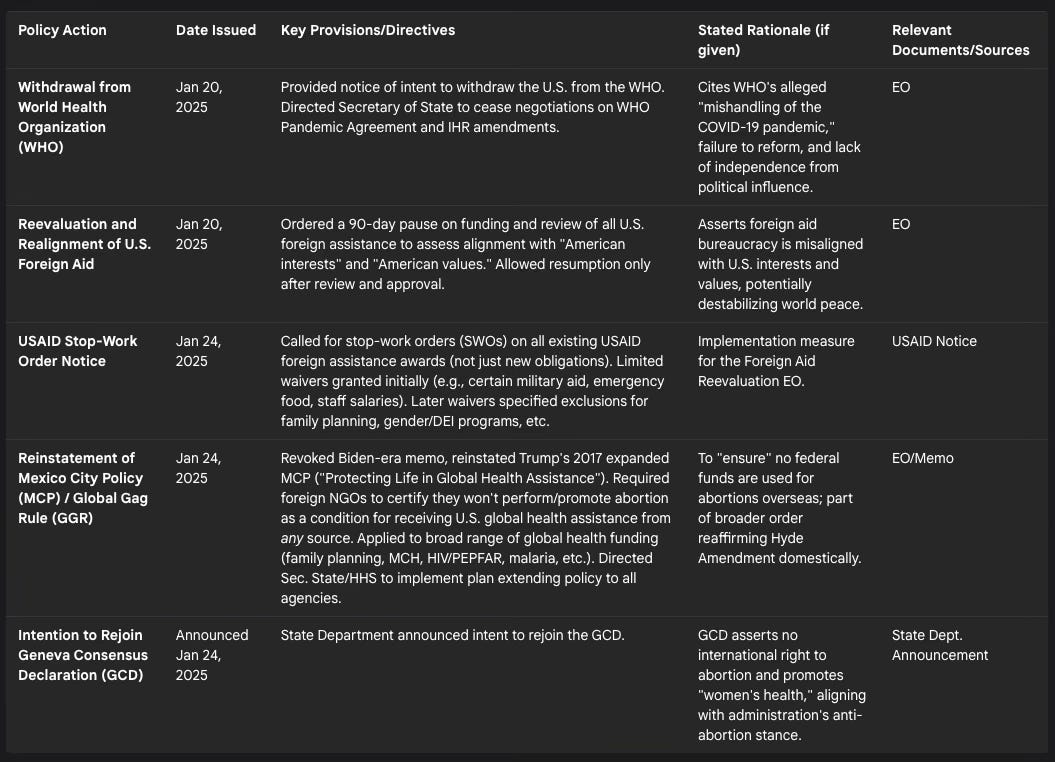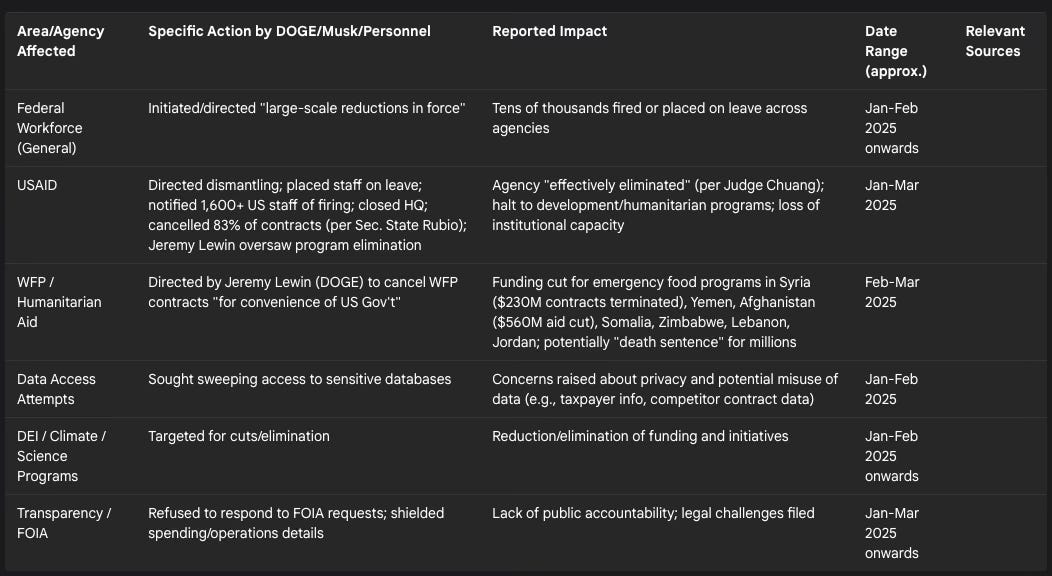- Pascal's Chatbot Q&As
- Posts
- This Analysis Examines the Responsibility and Potential Liability of Donald Trump and Elon Musk for Reported Impacts on the International Planned Parenthood Federation's (IPPF) Global Activities.
This Analysis Examines the Responsibility and Potential Liability of Donald Trump and Elon Musk for Reported Impacts on the International Planned Parenthood Federation's (IPPF) Global Activities.
Trump holds primary responsibility for the overarching policy directives (...), while Elon Musk bears primary responsibility for (...) the broad aid cuts (...) implemented via DOGE.
Analysis of Responsibility and Potential Liability Regarding Impacts on the International Planned Parenthood Federation (IPPF) in Early 2025
by Gemini Advanced, Deep Research with 2.5 Pro.
1. Introduction
The commencement of the second administration of President Donald J. Trump in January 2025 marked a period of significant and rapid policy shifts, particularly concerning U.S. foreign assistance, global health engagement, and federal government operations. Within weeks, a series of executive actions reshaped the landscape for international non-governmental organizations (NGOs), including those providing sexual and reproductive health (SRH) services. Concurrently, the establishment and operation of a novel entity, the "Department of Government Efficiency" (DOGE), ostensibly led by businessman Elon Musk, introduced a new dynamic of federal agency restructuring and budget reduction.
Reports emerged by April 2025 detailing severe negative impacts on the International Planned Parenthood Federation (IPPF), a major global provider of SRH services, attributing these consequences to the actions of the Trump administration.1 This analysis examines the responsibility and potential liability of Donald Trump and Elon Musk for these reported impacts. It scrutinizes the specific policy framework established by the Trump administration in early 2025, investigates the mandate and actions of DOGE, evaluates the documented role and influence of Elon Musk, corroborates the reported impacts on IPPF using publicly available information, and analyzes the attribution of responsibility based on the available evidence. The report considers the interplay between established policy directives, such as the reinstatement of the Mexico City Policy, and the operational actions of DOGE in contributing to the challenges faced by IPPF.
2. Trump Administration Policy Framework Affecting Global Health and Foreign Aid (January-February 2025)
The initial weeks of the second Trump administration saw the swift implementation of several key policy decisions via executive orders and memoranda, establishing a significantly altered environment for global health funding and foreign assistance programs. These actions formed the foundational policy context within which organizations like IPPF operated and subsequently faced challenges.
Table 1: Key Trump Administration Policy Actions Affecting Global Health/Foreign Aid (Jan-Feb 2025)

These policy actions collectively signaled a dramatic shift. The reinstatement of the expanded Mexico City Policy directly targeted organizations involved in abortion-related services or advocacy, including major SRH providers like IPPF, by conditioning a vast swathe of U.S. global health funding (estimated at $7.3 billion in FY20 when last in effect ) on compliance. This policy, historically implemented by Republican administrations and rescinded by Democrats, forces foreign NGOs to choose between receiving U.S. health funding and providing or advocating for abortion services using any funds, leading to documented service disruptions and clinic closures.
Simultaneously, the sweeping 90-day freeze on nearly all U.S. foreign assistance, implemented via stop-work orders affecting existing contracts , created immediate operational paralysis and funding uncertainty for countless NGOs across all sectors, including health. The explicit exclusion of activities like family planning and gender programs from initial waivers further compounded the pressure on SRH organizations. The withdrawal from the WHO and the planned rejoining of the anti-abortion Geneva Consensus Declaration underscored a broader move away from multilateral health cooperation and established international norms on reproductive rights. This multi-pronged policy offensive established by President Trump's executive actions created an environment of direct restriction (MCP) and systemic disruption (aid freeze, multilateral disengagement) for organizations like IPPF.
3. The Department of Government Efficiency (DOGE): Mandate, Actions, and Controversies
Established on the first day of the new administration, the Department of Government Efficiency (DOGE) quickly became a central, albeit controversial, instrument for implementing broad changes across the federal government.
Establishment and Mandate: President Trump created DOGE via Executive Order 14158 on January 20, 2025. The order publicly renamed the existing United States Digital Service (USDS) as the United States DOGE Service (maintaining the USDS acronym) within the Executive Office of the President. It also established a temporary organization within USDS, the "U.S. DOGE Service Temporary Organization" (USDSTO), tasked with advancing the president's 18-month "DOGE Agenda" and set to terminate on July 4, 2026. The stated purpose was to "modernize Federal technology and software to maximize governmental efficiency and productivity". Publicly, DOGE was framed as an initiative to cut "waste, fraud, and abuse," streamline bureaucracy, reduce spending, and potentially leverage technologies like AI.
Leadership and Elon Musk's Role: Following discussions during the 2024 campaign, President Trump announced that billionaire Elon Musk, a significant financial contributor to his campaign, would lead DOGE, initially alongside Vivek Ramaswamy. However, Musk's official status quickly became ambiguous. While Trump, Musk, and others publicly referred to him as the head or leader of DOGE , the administration contended in legal filings that Musk was merely an advisor with no formal employment status or authority over DOGE. This contradiction fueled confusion, particularly as the EO establishing DOGE specified an administrator role, which the White House later claimed was filled by an official named Amy Gleason, though reports suggested she did not actually lead operations. Despite these official claims, Musk's public statements and actions indicated significant control.
Documented Actions and Operational Style: EO 14158 granted USDS/DOGE "full and prompt access to all unclassified agency records, software systems, and IT systems," displacing prior orders that might pose barriers. Armed with this access and perceived authority, DOGE rapidly initiated disruptive actions:
Workforce Reductions: DOGE oversaw "large-scale reductions in force," leading to the firing or placement on administrative leave of tens of thousands of federal employees across numerous agencies.
Funding Freezes/Cuts: The entity was involved in freezing federal grant funds and directing specific, deep program cuts. This was particularly evident at the U.S. Agency for International Development (USAID), where DOGE lieutenant Jeremy Lewin was reportedly appointed to oversee program elimination, leading to the cancellation of major contracts, including with the World Food Program (WFP).
Targeting Specific Programs: DOGE's cuts disproportionately affected programs associated with administration priorities, including climate change initiatives, scientific research, Diversity, Equity, and Inclusion (DEI) programs , and large portions of foreign aid deemed wasteful or ideologically misaligned.
Data Access: Reports indicated DOGE sought broad access to sensitive databases containing personal information held by agencies like the Treasury Department, IRS, Social Security Administration (SSA), and HHS.
Operational Approach: DOGE's methods were widely described as aggressive and disruptive – a "sledgehammer" approach , a "slash and burn exercise" , causing "total chaos". Critics, including former Republican budget experts, suggested the cuts were driven more by political ideology than rigorous efficiency analysis. The administration notably sidelined or fired agency Inspectors General, who possess expertise in identifying actual waste and inefficiency, further suggesting that genuine efficiency was not the primary driver.
The focus on dismantling USAID, an agency Musk publicly denigrated as a "criminal organization" and a "viper's nest" , alongside cuts to DEI and climate programs, strongly indicates that DOGE functioned as a mechanism for rapidly implementing the administration's ideological agenda. The framing of "efficiency" appears to have served as justification for restructuring government functions and eliminating programs disfavored by the administration, aligning closely with proposals in the Project 2025 blueprint. The speed and breadth of the cuts suggest disruption and ideological alignment were prioritized over careful, evidence-based optimization of government functions.
Funding and Transparency Issues: Despite Musk's claims of "maximum transparency" , DOGE operated with significant secrecy. The administration refused to publicly release detailed information about DOGE's specific spending, operations, or full personnel list. DOGE was primarily funded through inter-agency transfers, utilizing the Economy Act, with funding soaring to nearly $40 million in its first month. This funding method, treating DOGE as if it were a standard federal agency while simultaneously shielding it from typical agency rules like the Freedom of Information Act (FOIA), raised legal questions about the propriety of the funding and the lack of oversight. DOGE actively resisted FOIA requests, claiming executive privilege or asserting it was not subject to FOIA, leading to litigation.
Legal and Constitutional Challenges: DOGE's actions, particularly the rapid dismantling of USAID, prompted significant legal challenges. A lawsuit filed by USAID employees and contractors argued that DOGE's actions violated the U.S. Constitution, specifically the Appointments Clause (Article II, Section 2), because Musk and other unelected DOGE officials were exercising significant executive authority reserved for officers appointed by the President and confirmed by the Senate. The suit also raised Separation of Powers concerns, arguing DOGE was effectively eliminating a Congressionally-established agency without legislative approval.
In March 2025, U.S. District Judge Theodore Chuang granted a preliminary injunction, finding the plaintiffs were likely to succeed on the merits. Judge Chuang explicitly rejected the administration's claim that Musk was merely an advisor, finding based on public evidence that Musk exercised "firm control over DOGE". The judge concluded that the actions taken to shut down USAID likely violated the Constitution and that the agency had been "effectively eliminated". The injunction indefinitely blocked DOGE from making further cuts to USAID and required the restoration of employee system access. This ruling strongly suggested that DOGE's operational model, reliant on the authority wielded by unelected figures like Musk to enact swift and drastic changes, involved significant constitutional overreach. This approach, while facilitating rapid implementation of the administration's agenda by bypassing established processes and checks, simultaneously exposed the administration to legal liability.
Table 2: Documented Actions and Impacts Attributed to DOGE/Elon Musk (Jan-Apr 2025)

4. Elon Musk's Documented Role and Influence
Elon Musk's involvement with the second Trump administration, particularly through DOGE, was prominent and impactful, though the precise nature of his authority remained contested.
Continue reading here: https://p4sc4l.substack.com/p/this-analysis-examines-the-responsibility